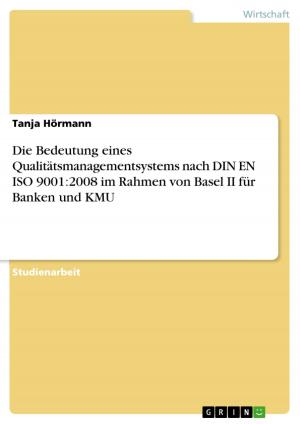| Author: | E. Dimant, M. Dysart, K. Lanoix, T. Leung, S. Lindner | ISBN: | 9783640816750 |
| Publisher: | GRIN Verlag | Publication: | February 2, 2011 |
| Imprint: | GRIN Verlag | Language: | English |
| Author: | E. Dimant, M. Dysart, K. Lanoix, T. Leung, S. Lindner |
| ISBN: | 9783640816750 |
| Publisher: | GRIN Verlag |
| Publication: | February 2, 2011 |
| Imprint: | GRIN Verlag |
| Language: | English |
Project Report from the year 2010 in the subject Business economics - Marketing, Corporate Communication, CRM, Market Research, Social Media, grade: 100%, Ottawa University, course: Multinational Business Policy, language: English, abstract: A passion for food was the driving force for Sinclair Beecham and Julian Metcalfe, two college friends who were hungry for tasty and healthy sandwiches, when they opened the first Prêt a Manger in 1986. The company was founded in London, England on the basis of making proper sandwiches while avoiding obscure chemicals, additives and preservatives that were common for prepared food in the market at the time. This one of a kind restaurant blossomed, as it offered consumers a product that could not be found anywhere else. Prêt a Manger has differentiated itself in three main categories: the menu, the level of customer service and the dedication to sustainability. A soup, sandwich or salad from Prêt a Manger is made with all natural ingredients. There are no artificial colours or no additives, just good taste. They get their supplies from local vendors and are always looking for new flavours in the area. Poor service cannot be found in a Prêt a Manger store. The staff are all exceptionally trained and treated for the best overall customer experience. Prêt a Manger's sustainability goals, which are primarily to reduce their environmental impact, are updated regularly as they want to continuously decrease their environmental footprint. The food industry leaves a lot of room for waste, but not for Prêt a Manger. They donate all their unsold sandwiches, salads and baguettes to the homeless at the end of each day. Prêt a Manger is privately owned, and thus does not have the pressure to grow as quickly as a public company does. However, they are continuously growing. There are over 200 stores in the UK and Prêt a Manger has expanded to New York City, Chicago, Washington DC and Hong Kong. Prêt a Manger is synonymous with good taste.
Project Report from the year 2010 in the subject Business economics - Marketing, Corporate Communication, CRM, Market Research, Social Media, grade: 100%, Ottawa University, course: Multinational Business Policy, language: English, abstract: A passion for food was the driving force for Sinclair Beecham and Julian Metcalfe, two college friends who were hungry for tasty and healthy sandwiches, when they opened the first Prêt a Manger in 1986. The company was founded in London, England on the basis of making proper sandwiches while avoiding obscure chemicals, additives and preservatives that were common for prepared food in the market at the time. This one of a kind restaurant blossomed, as it offered consumers a product that could not be found anywhere else. Prêt a Manger has differentiated itself in three main categories: the menu, the level of customer service and the dedication to sustainability. A soup, sandwich or salad from Prêt a Manger is made with all natural ingredients. There are no artificial colours or no additives, just good taste. They get their supplies from local vendors and are always looking for new flavours in the area. Poor service cannot be found in a Prêt a Manger store. The staff are all exceptionally trained and treated for the best overall customer experience. Prêt a Manger's sustainability goals, which are primarily to reduce their environmental impact, are updated regularly as they want to continuously decrease their environmental footprint. The food industry leaves a lot of room for waste, but not for Prêt a Manger. They donate all their unsold sandwiches, salads and baguettes to the homeless at the end of each day. Prêt a Manger is privately owned, and thus does not have the pressure to grow as quickly as a public company does. However, they are continuously growing. There are over 200 stores in the UK and Prêt a Manger has expanded to New York City, Chicago, Washington DC and Hong Kong. Prêt a Manger is synonymous with good taste.















